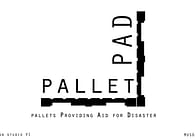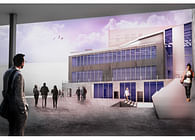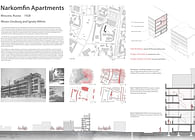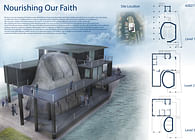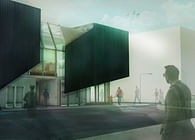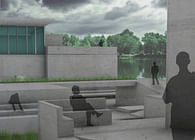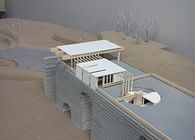
4th Year Spring Studio Project: Two Sites (Procession)
Lower Manhattan: Morgue / Death Research / Funeral Home / Chapel
Governor's Island: Ferry / Crematorium / Burial Grounds / Columbarium / Mausoleum
Summary:
Over the past 100 years in American culture, the topic of death has become a subject matter not comfortably spoken about. It has become a term that people will avoid using, whether due to a discomfort or an attempt to retain sensitivity. Perhaps even due to fear or refusal to accept this imminent reality. Society has made the term, “death”, interchangeable with statements such as, “passed away” and “no longer with us”. Rarely do we hear someone say, “he/she has died” or “he/she is dead”. One can attribute this to society’s regard of being sensitive with the subject or to society’s fear of the word, “death”, and all that it embodies. This includes an ultimate permanence that most deem to be disconcerting.
The driving concept of our design is conveyed through the question: How can architecture enhance the consciousness of inevitability and its cohesion with life through the visibility of death? The term, “inevitability”, serves as this ultimate permanence-“the inevitable”-death. Our architecture strives to enhance this awareness or perception of death. To bring to the conscious mind and to keep in the conscious mind the element of death. To provide a potential comfort through exposure and familiarity. By making visible the consciousness of death, its integration and cohesion with life can be fortified. Death is all around us. However, death becomes invisible due to the visibility of life. Life overshadows death. Religion aside: life is death, but death is not life. We force an estrangement between life and death. It becomes a thought that death is something that only happens to others. Death is more depicted as a moment in time, rather than a process. Architecture can provide the visibility of inevitability so that our culture can live more comfortably with the reality of death.
Narrative:
The project is derived through a procession between two sites. One located in lower Manhattan and the other located on Governors Island. Both sites constitute two processions of the body: living and dead. The urban site, (lower Manhattan), contains a multitude of programs. The deceased body enters from the public realm into the morgue. It then ascends through the building to the research facility and the funeral home, as the visibility of these spaces increases through a systematic implementation of materiality. The body experiences a shift from the public realm to a serene atmosphere as it ascends through the building. The dead body’s visibility to the living (public) increases as it ascends up through the building, as its maximum visibility is reached in the viewing spaces. The occupants perception of death is challenged through the exposure of the body and its process, giving them the opportunity to become familiar and comfortable with what has been visually and mentally ingrained. From this serene moment, the body is then brought back through the public realm and then transferred by ferry to Governor’s Island. This designated site is integrated with the existing recreational environment on the island. Upon first departing the ferry, the body’s procession first encounters the public atmosphere and is then transferred to the cremation process or the burial process. Throughout the site, concrete walls are implemented with an undulating landscape to create areas of recessed reflection and elevated exposure.The integration of life with death will aid in formulating a sense of normalcy and potential comfort in this experience of the inevitability of death.
Status: School Project
Location: Lower Manhattan, NYC & Governor's Island, NYC
My Role: Co-Designer
Additional Credits: Carly Bonsignore
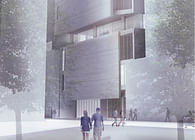
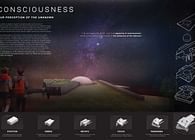
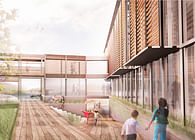
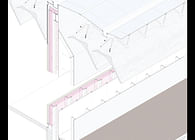
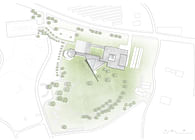
![Internal [PRO] jection Internal [PRO] jection](https://archinect.gumlet.io/uploads/6f/6f8dxonhxdpfhxpz.jpg?fit=crop&auto=compress%2Cformat&enlarge=true&crop=entropy&w=195&h=140)
